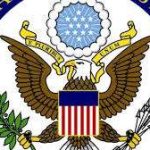
Released by the Bureau of Democracy, Human Rights, and Labor, January 30, 1997.
ARMENIA
Armenia has a constitutional government in which the President has extensive powers and the role of the legislature relative to the executive branch is severely circumscribed. The President appoints the Prime Minister, who is now in charge of the Cabinet. President Levon Ter-Petrossian was reelected in a controversial multicandidate election in September, which was flawed by numerous irregularities and serious breaches of the election law. The opposition rejected the official election results and asked the Constitutional Court to invalidate the Central Election Commission (CEC) decision on the results and to order a new election. The Court’s handling of the case did not assuage doubts about the credibility of the official election results. A transitional National Assembly in which ruling party loyalists hold about 88 percent of the seats was elected in July 1995; local and international observers characterized the 1995 elections as “generally free, but not fair.” Elections for a new National Assembly are scheduled for 1999. The Constitution provides for an independent judiciary; however, in practice judges are subject to political pressure from both the executive and legislature.
In October the Ministry of the Interior and the Ministry of National Security combined to form the Ministry of Internal Affairs and National Security which is responsible for domestic security, intelligence activities, border control, and supervises the national police force. The Ministry of Defense assists in domestic security during serious internal disorders. Some of the security forces committed serious human rights abuses.
Economic reforms continued to move forward in the face of many obstacles: The collapse of external trade links and sources of raw material that followed the Soviet Union’s demise; the lingering effects of the massive 1988 earthquake; and the threat of a renewed conflict in Nagorno-Karabakh. Despite these problems, gross domestic product (GDP) increased by 6 percent in 1996. Per capita annual GDP rose by about 14 percent to $533. Inflation remained low, and the currency was stable. The Government passed a property law and is currently in the process of issuing titles to real estate owners.
The Government’s human rights record remained uneven, improving incrementally in some areas, while serious problems remained in others. Its manipulation of the September presidential election continued to restrict citizens’ ability to change their government. Although the Government passed an improved election law and selected new members of the CEC, including a new chairman, international observers reported that serious breaches of the election law and numerous irregularities resulted in a lack of confidence in the integrity of the overall election process. International observers urged that the Government implement recommendations of international experts to address the flaws and rebuild public confidence in the electoral process. Members of the security forces beat detainees during arrest and interrogation and also beat passersby in areas adjoining demonstrations. These violations of the law by internal security personnel, notably the sixth directorate of the Ministry of Internal Affairs in Yerevan, continued in a climate of impunity from government sanction. Security forces continued to arbitrarily arrest and detain citizens. During the government crackdown following a violent demonstration after the presidential election, authorities beat and detained members of the opposition and demonstrators.
The Government signed an agreement with the International Committee of the Red Cross (ICRC) giving general and private access to detainees; however, the Government’s cooperation in implementing the agreement was uneven. Security forces also infringed on citizens’ privacy rights. The judiciary is subject to political pressure; however, in one notable case a court reversed the illegal actions of government officials; a district court judge overturned the decision of the Minister of Justice to dismiss the leadership and transfer ownership of a prominent independent newspaper. The Government continued to place some restrictions on freedom of the press; security forces beat and detained journalists after the September election, and journalists practice some self-censorship. Although reduced from previous years, credible reports of harassment and intimidation of journalists and editors continued. The number of local independent television and radio stations grew and, together with the press, were increasingly vocal and critical. However, the Government continued to dominate nationwide television and radio broadcasting. The Government imposed some limits on freedom of assembly and association especially during the post-election crackdown. A previously suspended prominent political party, the Armenian Revolutionary Federation (ARF/Dashnaks), was not reinstated, although the authorities tolerated its gatherings, news conferences and activities, and the Prime Minister initiated meetings with its representatives. The National Democratic Union’s (NDU) party office in Yerevan was closed for about 2 months following the postelection violence and not reopened until after the Constitutional Court ruling on the NDU’s election grievances. The Government retains some limits on freedom of religion. Discrimination against women and minorities is a problem.
RESPECT FOR HUMAN RIGHTS
Section 1 Respect for the Integrity of the Person, Including Freedom from:
a. Political and Other Extrajudicial Killings
There were no reported cases of political or extrajudicial killings.
b. Disappearance
There were no reported cases of political disappearance.
c. Torture and Other Cruel, Inhuman, and Degrading Treatment or Punishment
The Constitution and the law prohibit torture. However, the practice of security personnel beating detainees during arrest and interrogation continued. For example, Aramazd Zakaryan, an opposition National Assembly deputy with immunity, was beaten badly and detained for 2 days before being released to a hospital with broken ribs and a concussion. There were credible reports of threats to detainees’ family members. In the first days of the postpresidential election crackdown, while a ban on meetings was in effect, nonuniformed internal security forces beat and harassed passersby in the area where a demonstration was held. Two cases of police brutality were registered in the first half of the year. In each case, a detainee committed suicide in detention after having been severely beaten by police. Both cases are under consideration in the Supreme Court. Most cases of police brutality go unreported.
The office of the Prosecutor General (Attorney General) investigates allegations of mistreatment. If the investigation reveals evidence to support the allegations and if there is a serious violation of the law, the prosecutor’s office files criminal charges. Less serious cases are referred to the Ministry of Internal Affairs for administrative action.
There is no available information on whether or not the five cases of police brutality reported in 1995 were ever prosecuted.
Prison conditions are Spartan and often overcrowded. According to reliable reports, prisoners in “kartser” receive food every other day. There are not adequate medical and sanitary facilities in prisons, communicable disease is common, and some prisoners reportedly have died of treatable diseases.
In January the Government agreed to permit independent monitoring of prisoners by the ICRC. The ICRC was granted unaccompanied access to many political detainees. However, while the Ministry of National Security honored the terms of the ICRC agreement, often the Ministry of Interior was not cooperative. The ICRC experienced significant difficulties in gaining access to prisoners detained by the Ministry of the Interior after the September 25 assault on Parliament by some members of the opposition, and ICRC representatives were compelled to wait for more than 3 weeks for access to these prisoners. Only occasional visits were allowed. The Prosecutor General’s cooperation in carrying out the agreement was uneven.
d. Arbitrary Arrest, Detention, or Exile
Authorities continued to arbitrarily arrest and detain citizens without legal warrants. Those arrested are frequently brought to prison without notification of family members. It is often several days before family members obtain information as to whether someone has been arrested and their location. Access of lawyers and family members to prisoners is often restricted, particularly in the weeks after arrest.
During the Government crackdown on the opposition after the flawed presidential elections, international and domestic observers reported that 17 prominent opposition figures and over 100 participants in the September 25 demonstration were detained for violation of Article 74 of the Criminal Code, “participation in mass disorder”. Sixteen of the latter group were still being held on this charge at year’s end. Many detainees were held for 15 days of “administrative detention,” during which several were reportedly beaten, and access by international humanitarian groups was delayed or denied.
In addition four opposition deputies were detained before being stripped of their immunity by the National Assembly on September 26. During that National Assembly session, progovernment members of parliament assaulted some of these opposition deputies in front of national television cameras.
The transitional provisions of the Constitution provide that Soviet-era procedures for searches and arrests are to be maintained until the Soviet-era Criminal Code and Criminal Procedure Code are redrafted and brought into line with the Constitution. A suspect may be jailed for up to 12 months pending trial and completion of the investigation. If no sentence is passed during the period of detention, the suspect must be released. In spite of this provision, three suspects in a “satellite” case of the “Dro” trial were held for almost two years without trial. Informed sources stated that the three were charged with not reporting a state crime. After having been held almost a year beyond that allowed by law, they were released on their own recognizance pending the appeals in the “Dro” trial.
The long-running “Dro” trial concluded on December 10 with the judge pronouncing all defendants guilty and imposing three death sentences. The highest ranking Dashnak defendant, Hrant Markaryan, was found guilty of only minor crimes, leading Dashnak Party representatives to claim that the judge had found no link between the Dashnak Party and the “Dro”. The existence of such a link had been the government’s justification for suspending the Dashnak Party and related media outlets in 1994. The verdict has been appealed by both sides in the case. A second case, the “Trial of 31”, opened on March 15, and at year’s end had completed only its first stage. The main defendant, Dashnak leader Vahan Hovannisyan, went on a hunger strike in early November to protest delays in the proceedings. He stopped his strike 2 weeks later, reportedly at the request of the Dashnak Party. Most defendants in the case alleged they had been tortured and pressured into giving false testimony. Defense lawyers have filed numerous motions to investigate these allegations, but thus far the judge has denied the motions.
There is no provision for bail although detainees may sign a document and remain at liberty under their own recognizance pending trial.
On May 19, the Government released all known prisoners in custody at that time in conjunction with the Nagorno-Karabakh conflict. Subsequently, there were reports of the capture of other POW’s who had not been released at year’s end.
There were no reports of forced exile.
e. Denial of Fair Public Trial
Although the Constitution nominally provides for an independent judiciary, in practice courts are subject to political pressure from both the executive and the legislature. The provisions of the Constitution do not appear designed to insulate the courts from political pressure. Under the Constitution, the Justice Council, headed by the President, the Prosecutor General, and the Justice Minister, appoints and disciplines judges for the tribunal courts of first instance, review courts, and the Court of Appeals. The President appoints the other 14 members of the Justice Council and 4 of the 9 Constitutional Court judges. This gives the President dominant influence in appointing and dismissing judges at all levels. Judges are subject to review by the President through the Council of Justice after 3 years, whereupon they serve until they reach the age of 65.
The judicial system is in transition. A reform effort is now underway to completely revamp the judiciary, but has only just begun. Judges during the transition period must use a confusing array of Soviet-era laws and some new civil and criminal laws. However, civil and criminal codes are still under preparation. Adoption of new civil and criminal codes and enabling legislation to implement them is critical to the success of judicial reform.
According to the transitional provisions of the Constitution, the existing courts are to retain their powers until the new judicial system is established. The existing court system comprises a number of district courts, arbitration courts, a lame duck supreme court, a newly created Constitutional Court, and a military tribunal. District courts try the overwhelming majority of cases. There is no provision for a supreme court in the new Constitution, and the powers of the current court expire after a 3-year transition period. The Constitution envisages the creation of review courts and a court of appeals to handle cases previously sent to the Supreme Court. The Constitutional Court has jurisdiction over ensuring conformity of legislation with the Constitution and approves international agreements. The Court’s nine members are appointed either by the President or the parliament, the majority of which consists of progovernment members. It can only accept those cases proposed by the President, one-third of all National Assembly deputies, or election related cases brought by candidates for parliament or the presidency. The inherited Soviet prosecutorial system views the court largely as a rubber stamp for the procurator and not a defender of citizens’ rights.
Many corrupt and inefficient judges were replaced during the year. Early in the year, in accordance with constitutional provisions, the President issued a decree appointing numerous new judges, replacing over 60 percent of Soviet-era judges.
The military tribunal operates essentially as it did in the Soviet era. Military prosecutors perform the same functions as their civilian counterparts, operating in accordance with the Soviet-era legal code.
Trials are public except when government secrets are at issue. Defendants are required to attend their trials unless they have been accused of a minor crime not punishable by imprisonment. Defendants have access to a lawyer of their own choosing. The court appoints an attorney for any defendant who needs one. Defendants may confront witnesses and present evidence. The Constitution provides that those accused of crimes shall be informed of charges against them. Defendants and prosecutors have the right of appeal.
The Dashnak-related “Dro” trial concluded in December with all 11 defendants receiving a guilty verdict. Throughout, the trial was marred by procedural irregularities, allegations of torture, recanted testimony, and accusations of deliberate delay by the authorities in prosecuting the case. However, prominent Dashnak Hrant Markarian was acquitted of the charge of murder, discrediting the Government’s charge of criminal conspiracy between the “Dro Terrorist Organization” and the banned Armenian Revolutionary Federation (ARF or “Dashnaks”).
The Government reportedly held some political prisoners. Credible human rights organizations reported that the Ministry of Justice refused to register the nongovernmental organization Committee for the Defense of Political Prisoners on the grounds that there were no political prisoners, and such an organization was therefore unnecessary.
f. Arbitrary Interference with Privacy, Family, Home, or Correspondence
The Constitution prohibits unauthorized searches and preserves citizens’ rights to privacy and confidentiality of correspondence, conversations, and other messages. Procedurally, the security ministries must petition the prosecutor’s office for permission to tap a telephone or intercept correspondence. The prosecutor’s office purportedly must find a compelling need for the wiretap before it will grant the agency permission to proceed.
The law requires security forces to obtain a search warrant from a prosecutor before conducting a search; in practice, searches continue to be made without a warrant. During the postelection crackdown in September, the offices of the NDU and NSDU and homes of prominent NDU and NSDU members were searched without warrant. The Government subsequently permitted the reopening of these offices and promised compensation to the NSDU office.
There continued to be violations of the right to privacy during army conscription drives. There were several cases in which armed forces recruiters took hostages, in order to compel the surrender of draft-evading or deserting relatives. There are credible reports of forced conscription of several refugees from Nagorno-Karabakh and Azerbaijan.
Section 2 Respect for Civil Liberties, Including:
a. Freedom of Speech and Press
The Constitution provides for freedom of speech and the press; however, while the Government generally respects freedom of speech, it has placed some significant restrictions on freedom of the press. Most independent and opposition newspapers operate with extremely limited resources and depend on the Government for publication and distribution facilities–an arrangement that has continued intact from the Soviet period.
However, the Government has begun to divest itself of the state publishing apparatus and has disbanded the Ministry of Information.
A growing number of printed publications present lively debate and a variety of views. The opposition press regularly criticizes government officials and policies; however, those who report on major corruption or national security issues risk government and other reprisal such as detention, beatings, threats, false prosecutions, and harassing tax audits. The Government provides a list of “forbidden subjects,” and accordingly journalists practice some self-censorship.
During the period following the postelection government crackdown in late September (see Section 2.b.), the opposition press continued to print articles critical of the Government, including reports and analyses written by released opposition figures. However, security forces beat and detained some members of the press after the election. There was no access for the opposition to television or radio after the elections. Troops cordoned off state broadcasting outlets and independent HAI-FM radio station took itself off the air. The opposition’s Hairikhyan was given 10 minutes of airtime in October to announce the postponement of an opposition rally. The new Yerevan Press Club objected strongly to the Government’s restrictive draft press law, which was pulled back for renewed consideration. Armenian media organizations have submitted a new draft press law for government consideration. However, Dashnak party-affiliated media outlets, which were shut down in December 1994, remained closed.
Television and radio broadcasting is largely controlled by the Government. There are 3 functioning independent radio stations and 10 small independent television stations, the latter of which operate largely in the regions outside of Yerevan.
Broadcast media coverage of presidential candidates prior to the September election gave an overwhelming advantage to incumbent President Ter-Petrossian. The Organization for Security and Cooperation in Europe (OSCE) election observer mission noted in its September 24 statement that Ter-Petrossian had 16 times more editorial coverage on state television than his nearest challenger in the weeks prior to the election. According to the OSCE, this “far exceeded what is normal in such contests elsewhere in the world.” State television did, however, provide 90 minutes of free airtime per presidential candidate during the campaign, and provided more balanced coverage than during the 1995 parliamentary elections.
The judge in a court case involving the ownership of the independent newspaper Azg ruled in favor of the local operators and against the Ministry of Justice, which was attempting to unilaterally transfer ownership to parties more supportive of the current Government.
There is no evidence that the Government inhibits or censors importation of international newspapers and magazines. The Internet and electronic mail have greatly increased the amount of foreign and domestic information available to both governmental and nongovernmental outlets. Middle and upper class Armenians have access to international satellite television from abroad, including Russian and Turkish television, which erodes the Government’s near monopoly on television.
The Government respects academic freedom. Over 50 private institutions of higher education have been established since independence in 1991.
b. Freedom of Peaceful Assembly and Association
The Constitution provides for freedom of assembly, and the Government generally respects this right in practice, with some important exceptions. On September 24 and 25, massive peaceful demonstrations were held in Yerevan protesting the results of the September presidential elections. However, some of the demonstrators turned violent on September 25, leading successively to a break-in at the parliament building, the beating of the Speaker and Deputy Speaker, and a government crackdown which involved banning public meetings for 2 weeks. Peaceful demonstrations then resumed.
The Constitution provides for freedom of association, and the Government generally respects this right in practice with some important exceptions. There are registration requirements for all parties, associations, and organizations. No political parties were refused initial registration in 1996.
During the postelection crackdown, although parties were not banned, opposition offices were closed and one, the NDU office, remained closed until after the Constitutional Court ruling on its election grievances in November.
The ARF/Dashnak party, suspended since 1994, had an application for reinstatement pending with the Ministry of Justice. The Ministry of Justice by year’s end had yet to provide a written response to the application, although the law requires an answer within 30 days of filing. Although the activities of the party are still officially suspended, officials have not interfered while the party held a 2-week congress, elected a new governing body, held news conferences, and actively supported the opposition’s National Alliance, forming a part of the Alliance’s five-party leadership. The authorities charge that the presence of foreign members in the ARF’s ruling body, the International Bureau, violates the law on public political organizations. The party reconstituted its ruling bodies during the year and claims to have created purely indigenous local structures.
c. Freedom of Religion
The Constitution provides for freedom of religion; however, in practice the law imposes restrictions on religious freedom.
The 1991 Law on Religious Organizations establishes the separation of church and state, but grants the Armenian Apostolic Church (the Armenian Orthodox Church) special status. A variety of religious organizations, including Protestants, Mormons, and others hold services. The Armenian Orthodox clergy resent the inroads made by nonapostolic religions in recent years.
The law forbids proselytizing and requires all nonapostolic religious denominations and organizations to register with the Ministry of Justice. Petitioning organizations must “be free from materialism and of a purely spiritual nature,” and must subscribe to a doctrine based on “historically recognized holy Scriptures.” A presidential decree issued in 1993 supplemented the 1991 law and strengthened the position of the Armenian Apostolic Church. The decree enjoins the Council on Religious Affairs to investigate the activities of the representatives of registered religious organizations and to ban missionaries who engage in activities contrary to their status. No action was taken against missionaries in 1996.
A religious organization refused registration cannot publish a newspaper or magazine, rent a meeting place, have its own program on television or radio, or officially sponsor the visas of visitors. One nonapostolic religious organization
was denied registration by the Ministry of Justice during the year the grounds that it does not permit military service. Three religious organizations were registered, bringing the total of churches and religious organizations registered to 43.
Despite the Government’s pledge to apprehend those who staged a series of attacks against a dozen nonapostolic religious groups in 1995, the authorities have made no arrests. No attacks were reported in 1996.
d. Freedom of Movement within the Country, Foreign Travel, Emigration, and Repatriation
The Constitution provides for freedom of movement within the country, foreign travel, emigration, and repatriation, but the Government places restrictions on some of these rights. According to informed estimates, up to one-third of the population has temporarily or permanently emigrated during the last 7 years. Travel passports may be denied to persons possessing state secrets and to those whose relatives have made financial claims against them. The Office of Visas and Registrations (OVIR) has eased travel and emigration procedures by discontinuing the requirement for exit visas. The Government publicly appeals to Armenians who have emigrated to return, and a small flow of repatriates has begun. The Government does not restrict internal movement; citizens have the right to change freely their residence or work place.
The 1988-89 anti-Armenian pogroms in Azerbaijan caused an exchange of populations between the two republics. The ethnic minorities on both sides were subject to discrimination and intimidation, often accompanied by violence intended to drive them from the country. All of the ethnic Azeris living in Armenia at the time, some 185,000 persons, fled to Azerbaijan. Of the 400,000 ethnic Armenians then living in Azerbaijan, 330,000 fled to and were granted refugee status in Armenia. The majority of the rest took refuge in Russia with small numbers remaining in Azerbaijan.
Armenia is a signatory to the 1951 U.N. Convention on Refugees and its 1967 Protocol. The National Assembly passed a Law on Citizenship, Article 10 of which provides for refugees to gain citizenship, provided they are stateless and have resided in the country for the past 3 years. Implementing regulations for the law and naturalization procedures are being worked out with the United Nations High Commissioner for Refugees. The status of those who remain refugees will continue to be unclear until a Law on Refugees is passed. Currently, there is a 5-year state program on refugees (1994-1999). The program’s goal is to help the refugees integrate into the community. This program deals exclusively with refugees of Armenian nationality who have fled states in the region.
The Government cooperates with the Office of the UNHCR and other humanitarian organizations in assisting refugees. The Government provides first asylum and provided it to fewer than 50 persons in 1996. There were no reports of forced return of persons to a country where they feared persecution.
Section 3 Respect for Political Rights: The Right of Citizens to Change Their Government
The Government’s manipulation of the presidential election continued to restrict the Constitutional ability of citizens to change their government peacefully.
The outcome of the September presidential elections, in which incumbent President Ter-Petrossian officially was declared the victor in the first round of balloting with 51.75 percent, was contested by his leading challenger Vazgen Manukyan, who officially garnered 41.29 percent of the vote. Fifty percent of the vote by one candidate was required to avoid a second round of elections. Manukyan’s National Alliance filed an appeal to the Constitutional Court. An OSCE election observer mission noted “irregularities,” “discrepancies,” and “very serious breaches of the election law” which caused “concern for the overall integrity of the election process.” The final report of the OSCE mission concluded that the breaches in the election law “can only contribute to a lack of confidence in the integrity of the overall election process.” Specific problems during the election process included intimidation; unauthorized persons in polling stations; irregularities in military voting, especially instructions by officers to troops on their voting choice; vote tabulation; verification; and the aggregation of results. Local organizations that observed the 1995 parliamentary elections were not explicitly permitted to observe under the new presidential electoral law. Citing the law’s silence, the CEC refused to allow such observers.
In response to the official election results, opposition candidates Manukyan and Manucharian claimed fraud and appealed directly to the Constitutional Court in late October for new elections. The Court upheld the official election results in late November. Major questions were raised regarding the Court’s procedures in this case. The Central Election Commission refused requests by the opposition and international experts to release the detailed election protocols (voting results) from all voting precincts. The Constitutional Court denied the opposition’s request to publish all precinct results nationwide, confining its review to those precinct results presented by the appellants; 1,155 of a total of 1,596 precinct results were reviewed. To protest this and other aspects of the Court’s treatment of their case, the opposition walked out of the Court’s proceedings prior to its ruling. The Court’s decision rejecting the opposition’s appeal did not dispel doubts about the credibility of the official election results.
Although the Presidential election was flawed, observers agreed that the conduct of the preelection campaign–excluding opposition party media access–was an improvement over the 1995 parliamentary elections. All candidates with sufficient signatures were registered by the CEC. Opposition representatives participated as minority members of electoral commissions in all regional and most precinct and community levels. The opposition campaigned effectively and drew an impressive response from the voters. Checks and balances were enacted into law, which, if implemented, might have addressed many of the suspicions about vote manipulation. Multiple irregularities in the balloting and tabulation process undermined the credibility of the vote and remain a problem. The Government’s failure to address effectively these flaws eroded public confidence in the integrity of the electoral process and remains a source of deep polarization within the country.
Under the Constitution, the President appoints the Prime Minister and has considerable influence in appointing judges. The Constitution provides for independent legislative and judicial branches, but in practice these branches are not insulated from political pressure from the executive branch.
The Government appoints the 10 regional governors (marzpets). The Constitution gives local communities the right to elect local authorities. In November the first elections for municipal councils and mayors were held. The municipal elections were also characterized by extensive irregularities, notwithstanding the initial observation by Council of Europe observers that elections were “free and fair” at the precincts that they visited. In addition some opposition parties officially boycotted the elections in protest over the conduct of the presidential elections.
The National Assembly is to operate as a part-time institution for the duration of its first term. Approximately one-third of the parliamentarians have been designated full-time deputies. Parliament also has a truncated work schedule for its first term. Sessions may be called, but may not last more than 6 days.
There are no legal restrictions on the participation of women and minorities in government and politics. However, due to traditional social attitudes, both are underrepresented in all branches of government. There is one woman in Cabinet (Minister of Social Welfare), but no minorities. Only 11 of the 190 deputies in the Parliament are women.
Section 4 Governmental Attitude Regarding International and Nongovernmental Investigation of Alleged Violations of Human Rights
There are several fledgling nongovernmental human rights organizations that are active and operate openly, criticizing publicly and publishing their findings on government human rights violations. The Government at times impeded investigations into alleged violations of human rights by international human rights organizations.
The Government accepted an OSCE election observer mission for its presidential elections and provided international observers with countrywide access. However, local observer organizations, which had been given access during the 1995 parliamentary elections, were not allowed to observe the presidential elections (see Section 3).
The Government was generally cooperative in granting the ICRC access to prisoners of war and civilian detainees held by Armenia in connection with the Nagorno-Karabakh conflict. Prisoners on the ICRC lists were released in a prisoner exchange in May. The ICRC was also provided access to detainees facing politically motivated charges in connection with the “Dro,” “Trial of 31,” and other cases. However, the ICRC had significant difficulties in meeting with the prisoners detained by the Ministry of Interior following the government crackdown in September after the presidential election (see Section 1.c.).
Section 5 Discrimination Based on Race, Sex, Religion, Disability, Language, or Social Status
Discrimination based on race, sex, religion, disability, language, or social status is prohibited by the Constitution, but cultural and economic factors prevent women, ethnic and religious minorities, and persons with disabilities from participating fully in public life.
Women
The Legal Code (the old Soviet code) cites specific punishments for rape, forced abortion, forbidding a woman from marrying, and discrimination in hiring due to pregnancy. There is no specific law banning violence against women. Few cases of rape, spouse abuse, or other violence against women are reported in this conservative, patriarchal society, although their number is likely higher than the statistics indicate. Between January and September, the Interior Ministry registered 32 cases of rape and attempted rape.
In the workplace, women receive equal pay for equal work, but are generally not afforded the same professional opportunities given to men and are often relegated to more menial or low-skill jobs. The 1992 law on employment prohibits discrimination in employment, but the extremely high unemployment rate makes it difficult to gauge how effectively the law has been implemented to prevent discrimination.
Currently there are more women receiving university and postgraduate education than men.
Children
The Government does not have the economic means to provide fully for the welfare of children. The family tradition is strong, and child abuse does not appear to be a serious problem. The Government focuses its efforts on children’s rights and welfare with measures to insulate large families–four or more children–from the effects of the country’s current difficult circumstances. The Government similarly targets foreign humanitarian aid programs at large families.
Girls and boys receive equal educational educational opportunities as education is highly prized for both men and women.
People with Disabilities
The Constitution provides for right to social security in the event of disability. The 1993 Law on Invalids provides for the social, political, and individual rights of the disabled but does not mandate the provision of accessibility for the disabled. In its current economic circumstances, the Government has difficulty making good on its commitments in this area. The Government’s enforcement of the rights of the disabled remains rudimentary. There is societal discrimination against the disabled.
Religious Minorities
In June the Catholicos of all Armenians, Karekin I, who heads the Armenian Apostolic Church, received a large delegation of the Armenian Evangelical Church (AEC), which is the second largest Armenian religious body. The two set in motion a new ecumenical spirit that had been lacking since the AEC was established 150 years ago. This process is expanding to include Orthodox-Protestant cooperation in religious education.
Although minority religious groups, especially new religious movements, are not widely accepted in society, there was no violence against minority religious groups.
National/Racial/Ethnic Minorities
The Government does not discriminate against the small communities of Russians, Jews, Kurds, Yezids, Georgians, Greeks, and Assyrians in employment, housing, or health services. Following the protracted conflict (see Section 2.d.), there is no significant Azeri minority. There are several hundred Azeris or persons of mixed Azeri heritage still living in Armenia, but they are isolated from one another and maintain a low profile. Although there have been no reported cases of persecution, they face societal discrimination.
The Constitution grants national minorities the right to preserve their cultural traditions and language, and the 1992 law on language provides linguistic minorities the right to publish and study in their native language. There are publications in minority languages, but the Government has not devoted sufficient resources to organizing minority language schools. In practice, virtually everyone, including members of the Yezid, Greek, and Jewish communities, speaks Armenian. There are no known allegations of persecution based on minority group among the non-Azeri minority groups.
Section 6 Worker Rights
a. The Right of Association
The Constitution provides employees with the right to form and join trade unions and the right to strike. The Constitution stipulates that the right to form associations–including political parties and trade unions–may be limited with respect to persons serving in the armed services and law enforcement agencies. A 1993 presidential decree prohibits the Government and other employers from retaliating against strikers and labor leaders. In practice labor organization remains weak due to high unemployment and stalled industry.
Unions are free to affiliate with international organizations.
b. The Right to Organize and Bargain Collectively
Collective bargaining is not practiced. The Constitution provides all citizens with the right to a just wage no lower than the minimum set by the Government. Although the 1992 Law on Employment provides for the right to organize and bargain collectively, voluntary and direct negotiations do not take place between unions and employers without the participation of the Government because nearly all enterprises, factories, and organizations remain under state control. The near collapse of major industrial production has undercut the organization of labor unions.
The Government encourages profitable factories to establish their own pay scales. Factory directorates generally set the pay scales, without consultation with employees. Wage and other labor disputes are adjudicated through the Arbitration Court.
There are no export processing zones.
c. Prohibition of Forced or Compulsory Labor
The Constitution and the 1992 law on employment prohibit forced labor, and it is not practiced. This provision is enforced by the local councils of deputies, unemployment offices, and, as a final board of appeal, the Arbitration Commission.
d. Minimum Age for Employment of Children
Child labor is not practiced. According to the 1992 Law on Employment, 16 years is the minimum age for employment. Children may work from the age of 14 with the permission of a medical commission and the relevant labor union board. The Law on Employment is enforced by the local councils of deputies, unemployment offices, and, as a final board of appeal, the Arbitration Commission.
e. Acceptable Conditions of Work
The Government sets the minimum wage by decree. In July the national minimum wage was set at $2 dollars (820 drams) per month. The standard legal workweek is 41 hours.
Given the cost of living, employees paid the minimum wage cannot support either themselves or their families on their pay alone. The overwhelming majority of the population lives below the officially recognized poverty level as a result of the economic dislocations caused by the breakup of the Soviet Union, the 1988 earthquake, the conflict in Nagorno-Karabakh, and the resulting blockade and disruptions in trade. The vast majority of enterprises are either idle or operating at only a fraction of their capacity. Some furloughed workers are still receiving minimal partial compensation from their enterprises, but most are no longer receiving any payment if they are not working.
The Constitution provides citizens with the right to clean and safe work places, but Soviet-era occupational and safety standards remain in force. Labor legislation from 1988 places responsibility on the employer and the management of each firm to ensure “healthy and normal” labor conditions for employees, but it provides no definition of healthy and normal. The employment situation is such that workers would be afraid of the risk of losing their jobs and, therefore, it is unlikely that they would attempt to remove themselves from hazardous working conditions.
https://1997-2001.state.gov/global/human_rights/1996_hrp_report/armenia.html?
fbclid=IwAR0kb4Ndr_Ek0bcJkHVlS3NyXEfjLoYrn4Hq8oUX952HL3XUjQcbkGk8wFc





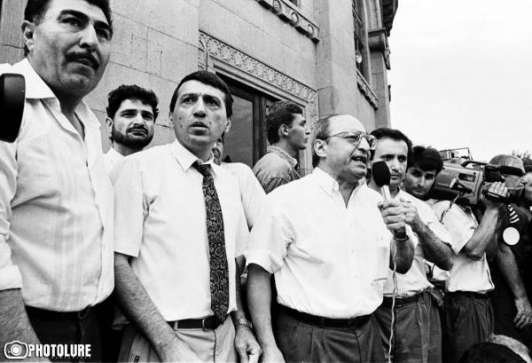
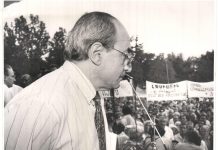
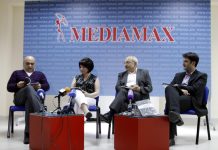
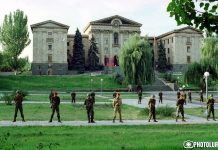



… [Trackback]
[…] Info on that Topic: vazgenmanukyan.am/en/1996-թվական/ […]
… [Trackback]
[…] Find More to that Topic: vazgenmanukyan.am/en/1996-թվական/ […]
… [Trackback]
[…] Find More on on that Topic: vazgenmanukyan.am/en/1996-թվական/ […]
… [Trackback]
[…] Read More here to that Topic: vazgenmanukyan.am/en/1996-թվական/ […]
… [Trackback]
[…] Info to that Topic: vazgenmanukyan.am/en/1996-թվական/ […]
… [Trackback]
[…] Find More Info here to that Topic: vazgenmanukyan.am/en/1996-թվական/ […]
… [Trackback]
[…] Read More to that Topic: vazgenmanukyan.am/en/1996-թվական/ […]
… [Trackback]
[…] Read More on that Topic: vazgenmanukyan.am/en/1996-թվական/ […]
… [Trackback]
[…] There you will find 73514 more Info on that Topic: vazgenmanukyan.am/en/1996-թվական/ […]
… [Trackback]
[…] Read More on on that Topic: vazgenmanukyan.am/en/1996-թվական/ […]
… [Trackback]
[…] Find More Info here on that Topic: vazgenmanukyan.am/en/1996-թվական/ […]
… [Trackback]
[…] Here you will find 49578 more Information to that Topic: vazgenmanukyan.am/en/1996-թվական/ […]
… [Trackback]
[…] Read More on on that Topic: vazgenmanukyan.am/en/1996-թվական/ […]
… [Trackback]
[…] Information to that Topic: vazgenmanukyan.am/en/1996-թվական/ […]
… [Trackback]
[…] Here you can find 72643 additional Info to that Topic: vazgenmanukyan.am/en/1996-թվական/ […]
… [Trackback]
[…] Information to that Topic: vazgenmanukyan.am/en/1996-թվական/ […]
… [Trackback]
[…] Read More Info here on that Topic: vazgenmanukyan.am/en/1996-թվական/ […]
… [Trackback]
[…] Find More Information here on that Topic: vazgenmanukyan.am/en/1996-թվական/ […]
… [Trackback]
[…] Info on that Topic: vazgenmanukyan.am/en/1996-թվական/ […]
… [Trackback]
[…] Read More to that Topic: vazgenmanukyan.am/en/1996-թվական/ […]
… [Trackback]
[…] Read More here to that Topic: vazgenmanukyan.am/en/1996-թվական/ […]
… [Trackback]
[…] Find More on that Topic: vazgenmanukyan.am/en/1996-թվական/ […]
… [Trackback]
[…] Info to that Topic: vazgenmanukyan.am/en/1996-թվական/ […]
… [Trackback]
[…] Find More Info here on that Topic: vazgenmanukyan.am/en/1996-թվական/ […]
… [Trackback]
[…] Info to that Topic: vazgenmanukyan.am/en/1996-թվական/ […]
… [Trackback]
[…] Find More Information here to that Topic: vazgenmanukyan.am/en/1996-թվական/ […]
… [Trackback]
[…] Find More to that Topic: vazgenmanukyan.am/en/1996-թվական/ […]